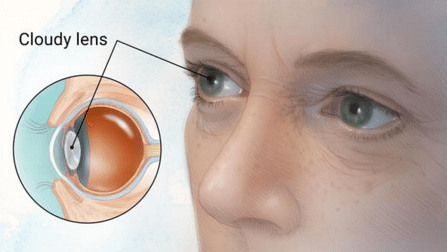
[cmamad id=”3425″ align=”center” tabid=”display-desktop” mobid=”display-desktop” stg=””]
Preventing cataracts naturally could be the key to avoiding cataract surgery!
It seems like everybody who gets older needs to have cataract surgery.
Cataracts cause your eye’s lens to get blurry and can result in full blindness.
To alleviate that blindness, doctors frequently recommend surgery to remove the cataract.
Cataract surgery is a fairly simple procedure.
What they do is, the doctor breaks up the lens of the eye.
Then they suction out the pieces.
After all the pieces have been removed, the doctors replace the lens.
But this new lens isn’t a biological lens.
This new lens is most often made of plastic.
 So, what’s wrong with the surgery?
So, what’s wrong with the surgery?
Cataract surgery is very successful in restoring sight to people who have cataracts.
But the plastic lens that replaces your real lens has some drawbacks.
It does not allow the same degree of airflow and blood flow that a real biological lens allows.
So researchers have been trying to find effective forms of cataract prevention.
[cmamad id=”3426″ align=”center” tabid=”display-desktop” mobid=”display-desktop” stg=””]
In this study, they found that the eye creates inflammatory chemicals.
This is a normal process that doesn’t stop after cataract surgery.
The eye creates chemicals called cytokines.
These are highly inflammatory and are created in the capsule holding the plastic lens in place.
 What this means is that inflammation has been taking place all along.
What this means is that inflammation has been taking place all along.
Although the lens doesn’t have blood flow, it is subject to inflammatory processes in the body.
Reducing this inflammation could be the key to how to prevent cataracts.
In fact, there may be a very simple way to prevent cataracts in the first place.
Researchers started looking to see if they could find a way to lower inflammation and prevent cataracts.
They started by looking at diabetes — a disease that has ALOT of inflammation.
In the study, they discovered a tiny link between diabetes and cataracts.
They found that people with cataracts have high levels of tryptophan in their blood.
 Tryptophan is a basic amino acid.
Tryptophan is a basic amino acid.
But tryptophan can cause a lot of harm in excessive quantities.
The researchers wondered if lowering tryptophan could be part of a natural cataract treatment.
Supposedly tryptophan is good for you.
It makes you sleepy, and you feel good after your turkey dinner.
But actually, tryptophan has a dark side.
It turns into serotonin in the body.
And excess serotonin can cause a lot of inflammation.
I think it’s the tryptophan and serotonin connection that is responsible for cataracts in the first place.
So what if cataracts are preventable?
It may not be possible to prevent cataracts altogether.
But it does seem quite possible to postpone the need for cataract surgery.
Cataract surgery involves removing the biological lens which has been doing a great job.
And then it’s replaced with plastic.
So, it would seem that cataract surgery should be done later in life –– if at all.
Many people throughout the world never get cataract surgery.
And these people have perfectly good eyesight.
So why is cataract surgery done so often?
It comes down to this.
Cataract surgery is a cash cow for ophthalmologists.
They make a fortune during cataract surgery.
And ophthalmologists often do several surgeries each workday.
So, in the study, they found that cataracts can be accelerated in diabetics.
Diabetics get cataracts sooner than nondiabetics.
But they found something more promising as well.
The researchers found that a bit of aspirin every day could postpone cataracts an average of 10 years.
The findings were true for both diabetics AND nondiabetics.
Aspirin acts as a natural treatment for cataracts even before cataracts are fully present.
 It seems that aspirin works in two steps.
It seems that aspirin works in two steps.
First, aspirin causes platelets in your blood to secrete their tryptophan.
And then the liver does its filtering job and sends the tryptophan out of the body in your urine.
The aspirin helps the body get rid of tryptophan.
Without tryptophan, there is less inflammation in the body,
So aspirin in beneficial in preventing the need for cataract surgery.
Aspirin is essentially a natural cure for cataracts and it’s already FDA approved.
There may be other ways to get rid of tryptophan, and to maybe never need cataract surgery at all.
There is also many other ways of inhibiting tryptophan.
Many foods contain tryptophan.
This makes it impractical to restrict tryptophan through avoiding foods.
The key is to make sure you get adequate B vitamins.
In particular, you want to get enough vitamin B1 and B3.
These both help the body to get rid of tryptophan.
Another way to reduce your tryptophan is to consume gelatin or collagen, plenty of taurine, and a bit of aspirin.
These may help you never to have cataracts or need cataract surgery.
So you can keep your natural eyes for your entire long lifetime.

http://www.aao.org/eye-health/diseases/what-is-cataract-surgery
Synthesis of interleukin- 1 and prostaglandin E2 by lens epithelial cells of human cataracts*
http://bjo.bmj.com/content/76/6/338.full.pdf
Plasma tryptophan in humans with diabetic and senile cataracts
http://www.sciencedirect.com/science/article/pii/S0014483581800486
Senile cataracts: evidence for acceleration by diabetes and deceleration by salicylate
http://www.ncbi.nlm.nih.gov/pubmed/7296356
